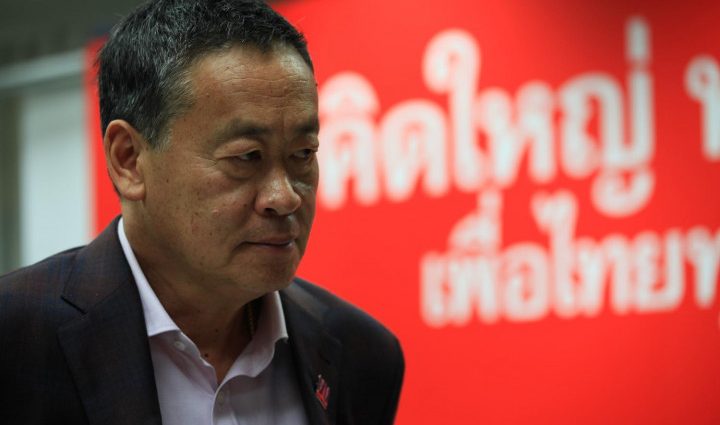
The Pheu Thai Party insisted yesterday its policy to give away 10,000 baht to everyone aged 16 and older can be implemented as soon as Jan 1 next year to replace the current state welfare card if it becomes the new government.
In response to its critics, the main opposition party, whose goal in the forthcoming election is to win a landslide victory, also dismissed criticism that the populist policy is way too extreme, saying it isn’t a populist one at all as it is actually a part of the party’s economic stimulus efforts.
As for sources of funding, the party said the money would come mainly from an expected rise in tax revenue and the budget allocated to unnecessary projects.
Srettha Thavisin, a prime ministerial candidate of Pheu Thai, yesterday led the party’s explanation of the controversial policy, following negative remarks made about the scheme after it was unveiled on Wednesday.
The 10,000 baht of money is aimed primarily at stimulating spending in communities in the first six months, with the help of blockchain technology that will ensure the money given is spent within a 4-kilometre radius to spur economic activity, he said.
Mr Srettha said it will help Thai GDP grow by at least 5% in 2024.
Six months is normally the average period for most small and medium enterprises to plan their stocks in advance. At the same time, the 4km radius is imposed to bar people from travelling a long distance to shop only at large department stores in city areas, he said.
Other schemes include ensuring a minimum household income of 20,000 a month, raising the minimum daily wage to 600 baht by 2027, increasing the salary for undergraduates to 25,000, limiting mass-transit fares to a flat 20 baht for all stations, providing a debt moratorium for farmers and raising income for farmers by three-fold over four years, he said.
The 10,000 baht is to be a one-time handout, which is expected to help boost the government’s revenue from collecting corporate taxes from shops whose sales will likely increase as a result of this economic stimulus, he said.
The tax revenue from this project alone is estimated to bring in 100 billion baht, while the budget required to fund this project is approximately 500 billion baht, he said.
He dismissed a suggestion to slash the military budget and divert the money to fund this project, saying certain parts of the state budget are necessary.
Aside from this, the government’s overall revenue is estimated to increase in this fiscal year by around 260 billion baht, said Prommin Lertsuridej, chief of Pheu Thai’s team working on the party’s policies and economic affairs committee, citing estimates by various state agencies.
The rest of the funding will be diverted from projects whose budget allocation no longer needs to be spent, said Mr Prommin.
Pheu Thai aims to spur the grassroots economy, which is seen as the foundation of the country’s economy, he said.
Upon the implementation of the 10,000-baht project, every Thai who is 16 years of age and older will have a new savings bank account and a digital wallet which will be automatically connected to his or her ID, said Paopoom Rojanasakul, deputy secretary-general of Pheu Thai.
Jakkapong Sangmanee, the registrar of Pheu Thai, said the party wouldn’t terminate the existing state welfare project for low-income people but, when the digital wallet project begins, most Thais will no longer want to use the state welfare card.
“This is a difference between ours [digital wallet policy] and the existing Pao Tang app [the G-wallet app of the caretaker government], which is old-school,” Mr Jakkapong said.

